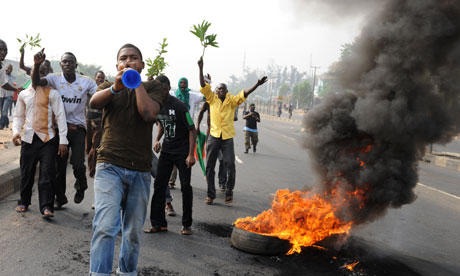Two people were killed and swaths of Nigeria ground to a halt on Monday as thousands of protesters took to the streets at the start of an indefinite strike against soaring fuel prices.
According to reports, one person was killed in the commercial hub of Lagos and another in the northern city of Kano, while dozens more were wounded as strikes spread out across the country. Police used live ammunition and teargas in attempts to disperse the crowds.
The usually packed markets and business district of Lagos, with its population of 11 million, emptied out. On the long stretches of highway that span the city's lagoons, only rare police headlamps pierced the rush-hour fog.
Not everywhere was deserted. Burning tyres lit the way to rallies across the city where thousands massed in protest at the government's decision to remove state subsidies on fuel as the new year began. That sent fuel prices in Africa's largest oil-producing country to about 65p a litre, and trade unions urged more than 2 million members to stage an indefinite strike that threatens to paralyse the country.
While much of the anger focused on the timing and manner of the subsidy removal, announced without warning barely a week after a string of attacks by the violent Islamist group Boko Haram, some analysts said it was a deliberate – and risky – gamble.
"It deflects attention from the Boko Haram violence and unites Nigerians, Muslims and Christians, against what is the lesser evil. But it means the president is battling on many fronts: radical militants and millions of Nigerians at the same time," said activist Shehu Sani.
In a small Lagos park, Seun Kuti, the son of Afrobeat pioneer Fela Kuti, addressed thousands, many waving branches and sporting T-shirts with the slogan "Remove corruption, not subsidy".
"Does the government think we are mumu [fools?]" he asked a cheering crowd, mixing pidgin English and Yoruba. "Food cost go rise, housing cost go rise, meanwhile ordinary Nigerian's salary no go rise."
Every previous government's attempt to remove the subsidy, which funnels a quarter of the £15.5bn annual government budget to a well-connected cartel of fuel importers, has floundered amid mass protests. Many see the subsidy as a rare opportunity to share in the nation's oil riches, whose 2m barrels per day industry has failed to lift the vast majority of citizens out of extreme poverty. In 2003, there were eight days of strikes when the government attempted to increase fuel prices.
Flanked by union leaders and Nigerian film stars and musicians, Kuti said the strikes would last until the government erased corruption. "There must be no compromise this time. When it comes to doing something that inflicts pain on ordinary Nigerians, the president is quick to do it. But members of his own cabinet have been indicted for corruption, yet they are rewarded by promotions in the government," he said.
A Lagos lawyer, Yewande Aina, 29, said this was her first anti-government demonstration. "Normally we are afraid of the police. But we have to take a stand this time – before they removed the subsidy, they should have consulted us if it's in our interests."
With an economic agenda to renew Nigeria's crumbling infrastructure and haul Africa's largest country into middle-income status, President Goodluck Jonathan appears determined to see through the cuts – even facing down opposition within his government.
He faces an uphill battle convincing citizens as decades of top-level mismanagement and corruption have left the country incapable of refining its own fuel. "Is it because the president has a PhD in zoology he wants to treat us like animals? The only way thousands of us could have come into the streets is because we are not happy with what our government is offering us," said Umar Afolabi in the northern town of Kaduna.
The country's stability appeared menaced as the president claimed some government and security officials were secretly backing Boko Haram. The shadowy organisation claimed responsibility for Nigeria's first suicide bombing, which killed 24 people in the UN building in the capital, Abuja, in August and has killed at least 30 in the last week. A wave of attacks that began with four church bombings on Christmas Day threatens to push Nigeria to the brink of sectarian civil conflict.
In the north, where several states are under a state of emergency after sectarian attacks, witnesses said one person died of gunshot wounds after demonstrators clashed with police in Kano. In Abuja, protesters chanted at dozens of police to "arrest Goodluck", but the crowds began to thin out in the midday sun.
"Many people are not quarrelling with the fact the subsidy isn't affordable or sustainable," former presidential economic adviser Bismarke Rewane said. "But we're already dealing with a looming sectarian crisis. On top of that, you're asking people to go through pain and sacrifice. So the real issue in contention is that there is no track record of credibility from this or the previous administration."









